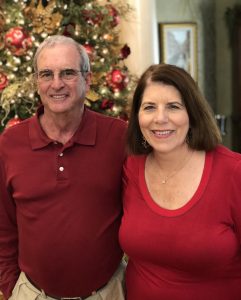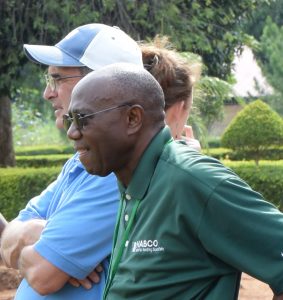 Would you tell us a bit about your background?
Would you tell us a bit about your background?
Tim: I grew up in Congo as a son of missionaries. My parents, grandparents, and uncle/aunt were all missionaries in Congo. I guess my roots in that country go pretty far back to the early years of Belgian colonial rule right up to the present. I went to boarding schools through high school, and then found myself in Kansas, attending Kansas Wesleyan University in Salina. While in college, I took a summer job on a construction crew building grain elevators. Eventually construction for agri-business became my life-long career. Here in Salina, I met a beautiful young woman, Cindy MacDowell, who was the cousin of my best friend from Congo. We got married and made Salina our home.
Cindy: I am a Kansas girl start to finish, having been born and raised in Salina. I also have connections to Congo though my family. My uncle and aunt were missionaries in Congo, and their children, my cousins, would come and be with us whenever their family was on home leave from Congo. Their lives seemed a bit strange, but interesting. Then I met Tim, who was my cousin’s best friend in Congo, and the rest is history. My life has been connected with Congo ever since.
How has education played a role in your life, personally?
Tim: Like a lot of young people out of high school, I really had no idea of what I wanted to do. As a kid growing up on remote mission stations and in boarding school, I discovered I had an aptitude for mechanics. I enjoyed taking apart engines, learning how they worked, and figuring out how to fix and rebuild them. I was pretty good at fixing things and building things. I went to college and majored in business administration, and honestly I’m not sure what I really learned. Having a degree opened doors, and got me into the office at the construction company where I was working. I guess college gave me the ability to see differently, to see what I needed to learn, and to apply that learning to new tasks and responsibilities. I learned from my experiences, and then with a friend, founded a company that has been pretty successful in the construction industry. Everything I’ve done comes from what I’ve learned, so I think learning is important. I guess I would say: “Unless you have an education, you won’t really know what life might have been like otherwise.”
What is your personal connection with Congo? Or, how did you first learn about Congo?
Tim: You’ve seen from our story so far that our connections with Congo are pretty deep. After we got married, I thought it would be cool to take Cindy to see where I grew up. So, we got married in July, set off on a low-budget trip in September, and spent three months with my folks and family in Congo.
Cindy: When I arrived in Congo in 1973, it was definitely a culture shock for me, having never before been outside of the USA. What I remember most about the Congolese people were their warm smiles and joy, their contentment in spite of hard lives and lack of material things. I remember their gracious hospitality and generosity — even though they had had very little, they would invite us to their homes for wonderful meals.
Tim: I have to hand it to Cindy! She took it all in and decided to stay with me despite my craziness and love for that place and its people. After about 10 years, we took a second trip to Congo, and in the last few years have gone again to see what Congo Initiative is doing.
How did you first learn about Congo Initiative?
 Tim: You know, Congo is a complex place for those of us who have spent time there. There is so much that is good; and at the same time there is so much that is hard. But I’ve always had a place in my heart for Congo. I’d sure like to see things change. I’d like to see the violence end. I’d like to see people having a better standard of living. I found out more about Congo from my friend, Paul Robinson (who is also married to Cindy’s cousin, Margie MacDowell). My learning about the Congo of today grew out of my relationship with them. We had some conversations, and Paul kept telling me about Congo Initiative and about his conviction that this Congolese vision had a real chance of making things better. He invited me to “come and see.” Traveling this road with Paul back to Congo has helped me to see that. I wouldn’t have made another trip to Africa, or gotten involved if it hadn’t been for that relationship.
Tim: You know, Congo is a complex place for those of us who have spent time there. There is so much that is good; and at the same time there is so much that is hard. But I’ve always had a place in my heart for Congo. I’d sure like to see things change. I’d like to see the violence end. I’d like to see people having a better standard of living. I found out more about Congo from my friend, Paul Robinson (who is also married to Cindy’s cousin, Margie MacDowell). My learning about the Congo of today grew out of my relationship with them. We had some conversations, and Paul kept telling me about Congo Initiative and about his conviction that this Congolese vision had a real chance of making things better. He invited me to “come and see.” Traveling this road with Paul back to Congo has helped me to see that. I wouldn’t have made another trip to Africa, or gotten involved if it hadn’t been for that relationship.
What were your initial reaction and thoughts when you learned about Congo Initiative’s main program and institution – the Christian Bilingual University of Congo (UCBC)?
Well, since those first conversations, and getting involved somewhat, I’ve developed somewhat of a passion to see UCBC survive and flourish. Then we really started talking about Congo, CI, and UCBC at family events. We just talked more and more, and started to communicate more deeply. I talked to my father, who had spent his life as a missionary in Congo, and asked what he thought of Congo Initiative and the new ways CI was approaching Congo’s development. My dad totally affirmed this “new thing.”
What inspired you to participate in leadership giving to UCBC?
It’s been a journey — what in Congo we would call a safari. Every time I visit, I believe in it more. I’ve met the people. I’ve talked to them in their language. I’ve spent time with UCBC’s students and graduates. I’ve seen for myself what is happening. It’s exciting and I have real hope and confidence that CI and UCBC are making a difference.
Congo is deeply embedded in my system. I think it’s fair to say that I “feel” Africa. I’ve been given much, and I want to be able to give back.
What encouragement would you give to the students at UCBC?
The last time I was in Congo, in 2016, another friend and colleague of ours, who grew up in Congo too, and who now leads CI in UK and Europe, Bill McAllister, gave a sermon in one of the churches near Beni. Bill spoke about the critical role education plays in building a better future. I believe this is true.
So, what I would say to UCBC students is what I did say to them when I was there. “Make a difference! There are a growing number of people who believe in you and who are happy to invest in you so that you can realize your dream. Be the change you want to be in Congo!”